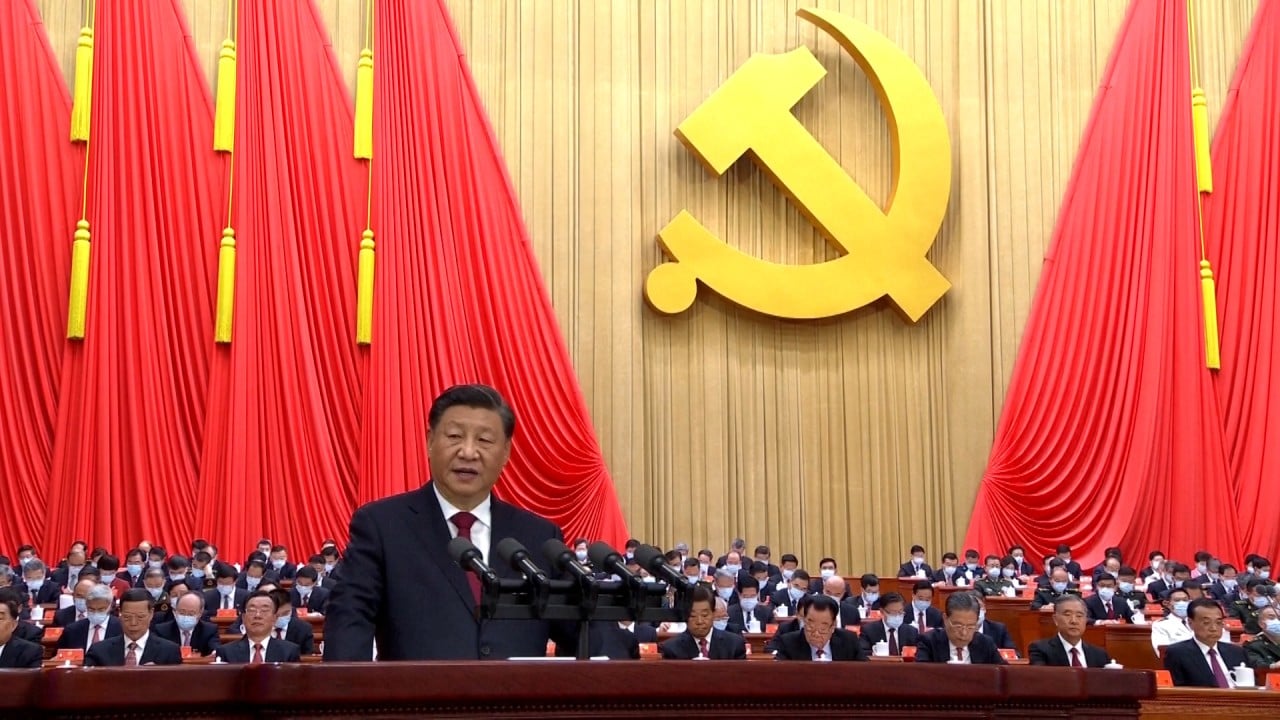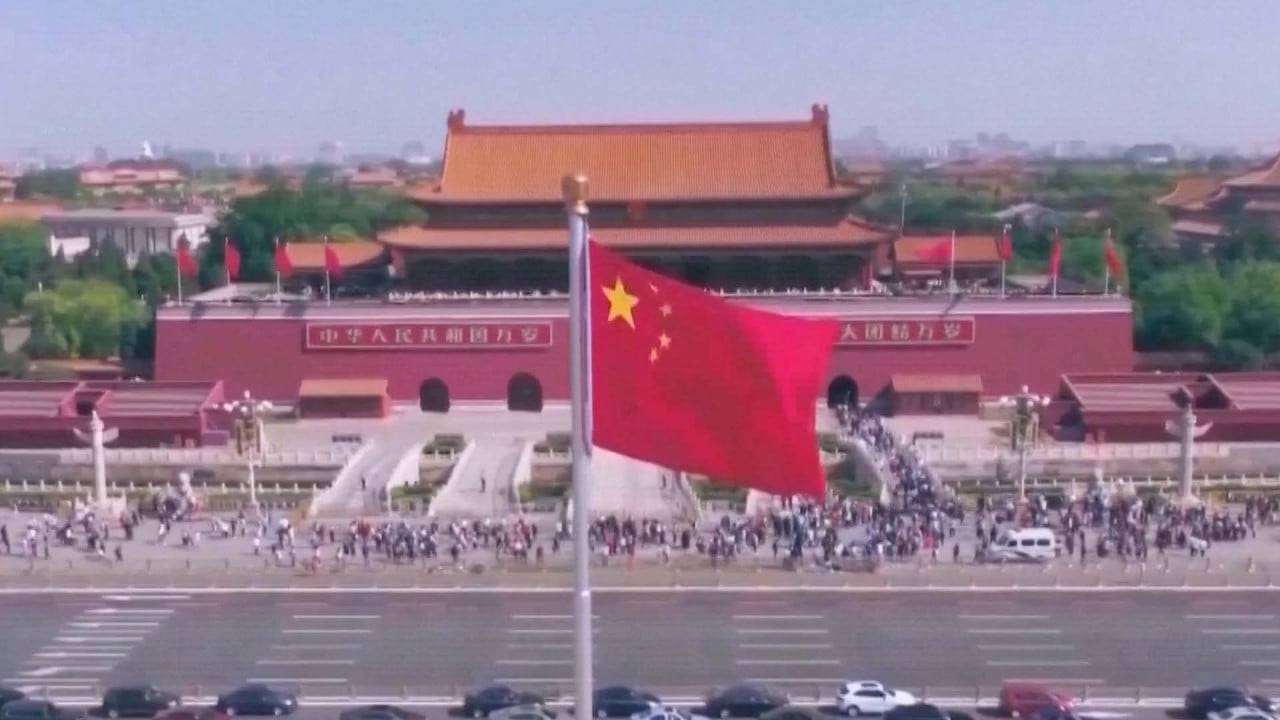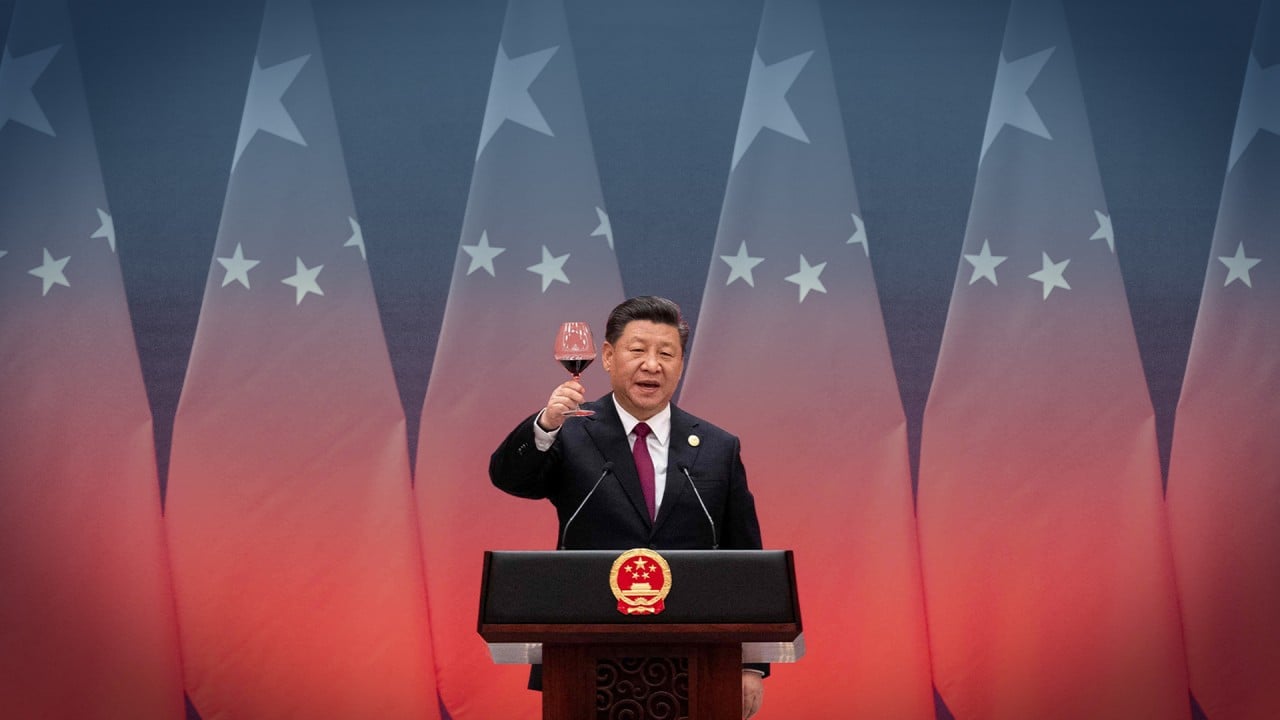
‘Incomparable glory’ awaits China on world stage, Xi Jinping tells party congress
- By 2049, when the People’s Republic will hold centennial celebrations, China should become a leading power in all aspects, Xi tells delegates
- Shorter report speech seen as a nod to frail party elders as well as a sign of increased centralisation of power in hands of leader
Flanked by party leaders past and future, President Xi Jinping on Sunday took centre stage to present his grand vision for China, promising “incomparable glory” to restore the country to the forefront of global powers.
The speech marked the beginning of a weeklong session ending on October 22, when a new Central Committee to head the 97 million party members will be formed and ratified.
The following day, the committee will vote to confirm the line-up of a new 25-member Politburo and seven-member Politburo Standing Committee – the highest decision-making body in Chinese politics.
Xi says China must brace for ‘dangerous storms’, as party congress kicks off
While Xi is set to get a convention-breaking third term as party leader, he will reshuffle many key positions and put together a new supporting cast for the next five years and beyond.
His work report, which took months to prepare, gives the president an opportunity to review past challenges and achievements and lay out his grand vision and goals for the nation.
In his 105-minute speech on Sunday, Xi highlighted the challenges and risks faced by the country and warned party members to brace for “dangerous storms” ahead.
But by rallying around the party centre, of which Xi is the core, they would be able to ride out the storms and guide the country to “incomparable glory”, he declared.
By 2049, when the People’s Republic will hold centennial celebrations, China should become a leading power in all aspects, Xi said.
Xi article gives insight into China’s direction ahead of party congress
To achieve this, the party will first aim to complete all modernisation programmes by 2035, turning China from the largest developing economy to a middle-to-high-income country, he said. This would mean that China will have successfully avoided the “middle-income trap”.
Building on the momentum, China will strive to become a leading global power by mid-century. This power will not only be measured by the size of China’s economy but also by its achievements in the fields of science and technology and culture, Xi said.
The Chinese military force, already the largest in the world, will become a “world-class fighting force”. On the environment front, China will also “largely eliminate pollution” and achieve carbon neutrality.
But he also said Beijing would show the “utmost sincerity and make the greatest efforts” to achieve such reunification by peaceful means, while stressing that it would not give up the use of force as a last resort.
Independence forces will ‘plunge Taiwan into abyss’, China warns
The speech delivered by Xi at the Great Hall of the People was an abridged version of his work report.
This was a departure from tradition, as the party chief usually reads out the entire document. The only exception was at the 16th party congress 20 years ago, when the then-party chief, Jiang Zemin, aged 76, also opted for a shorter version.
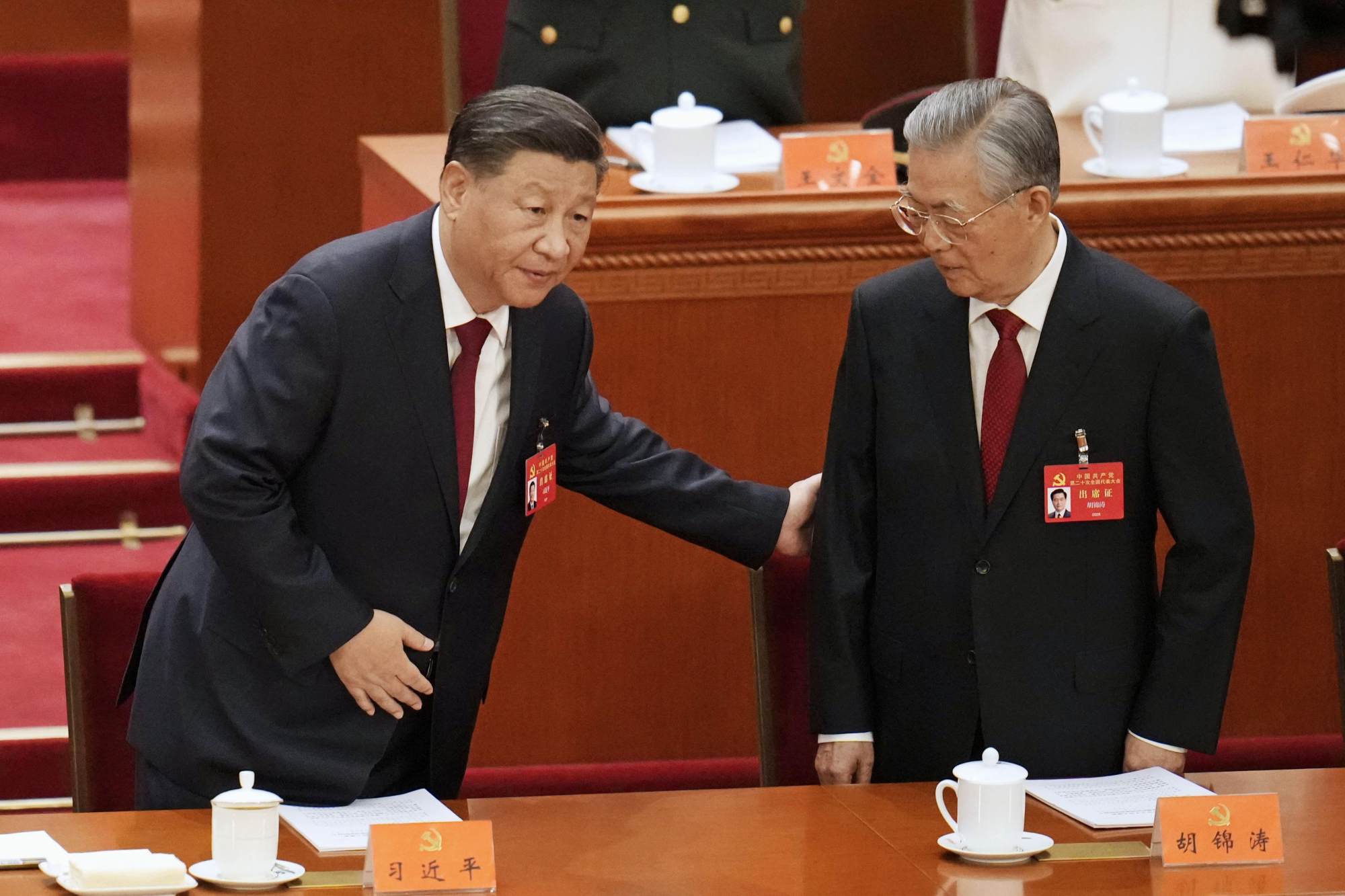
It is understood that Xi may have cut back his speech out of concern for the retired elderly party leaders who made a rare appearance to join him on stage. They included his predecessor Hu Jintao, 79, who looked tired and frail throughout the session.
At 105, Song Ping was the most senior party elder to appear on stage on the day.
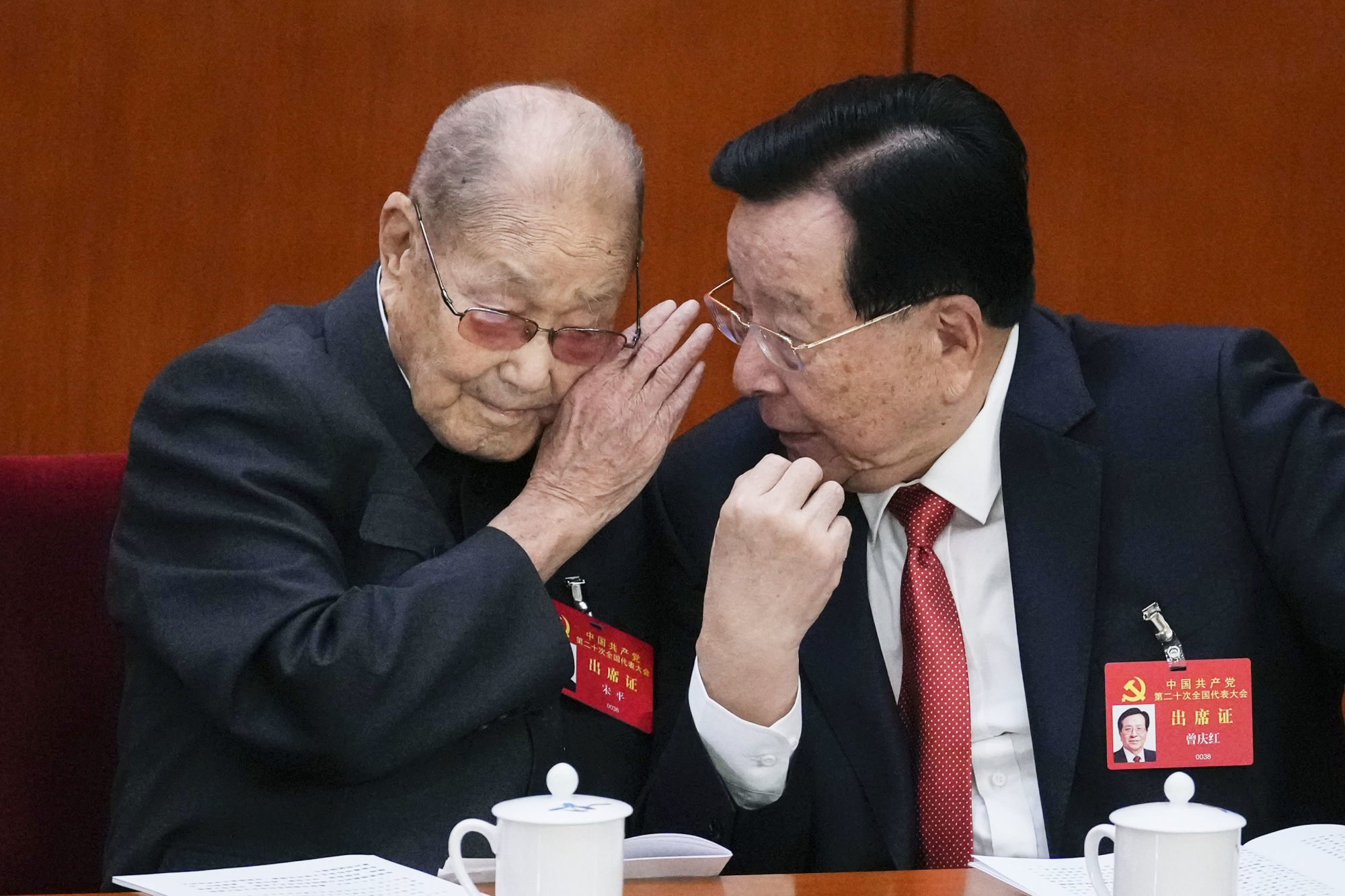
While the influence of party elders varies over time, their appearance this time could be largely symbolic. While Xi had sought their views, the president has a free hand to make all key decisions, the Post has learned.
Yu Jie, a senior research fellow on China at Chatham House – an independent policy think-tank based in London – is among analysts who see the shortened report as an indication of Xi’s firm hold on power.
“The 20th party congress report speech is significantly shorter than the 19th, a clear indication of Xi’s success in centralising power,” Yu said.
“The speech acts as a summary of the party’s achievements and future plans – expressed as the lowest common denominator of consensus between competing factions. A shorter report speech would seem to suggest smaller factional gaps in reaching consensus.”
While Xi did not mention the United States in his speech, he warned against a cold-war mentality – a catchphrase to describe Washington’s attempts to isolate China – as well as Western double standards, as he asserted that the country would not be bullied.
Further elaboration of the point came in the full work report released shortly afterwards.
“The attempt to suppress and contain China’s growth could escalate anytime,” the report read.
“We are entering a stage where great opportunities and risks coexist. Uncertainties and unpredictability are rising. All kinds of black swans and grey rhinos [unexpected and overlooked risks] could strike any time.
“We must have a keen sense of crisis and make thorough preparations. Only by doing that can we rise to the challenges ahead.”
Xi’s indirect message to the US in his Communist Party congress report
To mitigate the risks, Xi said the party needs to strengthen its work on national security and improve the protection of all major infrastructure and networks, as well as data, biosecurity, nuclear and space assets.
“We must improve our capacity to counter foreign sanctions, interference and long-arm jurisdiction,” the report said. Long-arm jurisdiction in party-speak usually refers to the US imposing its own laws and court orders on other countries.
China also needs to increase self-reliance in the food, energy and technology sectors, Xi said, as he listed technological innovation and scientific breakthroughs as key to achieving the development goals outlined in the report.
“We must speed up technological progress and self-reliance. We must pool our resources and focus on key areas to achieve breakthroughs, so that we can win the race in core technologies critical to our national strategy.”
The party must also develop more open, inclusive and efficient talent schemes to groom and attract top talents to China, Xi emphasised.

Xie Maosong, a senior fellow at Tsinghua University’s National Strategy Institute, described the work report as a “galvanising call” to the party and the Chinese people.
“This is the party’s first work report after its centennial celebration [in 2021], so it is not just meant [to resonate] for the next five years,” Xie said.
“It sets the goal of realising China’s great rejuvenation, and to do so by charting our own path and not following the Western model of political party rotation,” he explained.
Xi warns China’s rejuvenation will be no ‘walk in the park’
“To achieve that, the party needs to address the unique question of how to stay in power and win public trust continuously. It needs to provide a structural and systematic answer on ways to maintain a high-quality decision-making process and fight chronic corruption.”
Xi’s work report was the first highlight of the 20th party congress. The weeklong event is also expected to endorse a revision to the party constitution, which most observers believe will further elevate Xi’s position and governance philosophy.
Additional reporting by Josephine Ma and William Zheng




